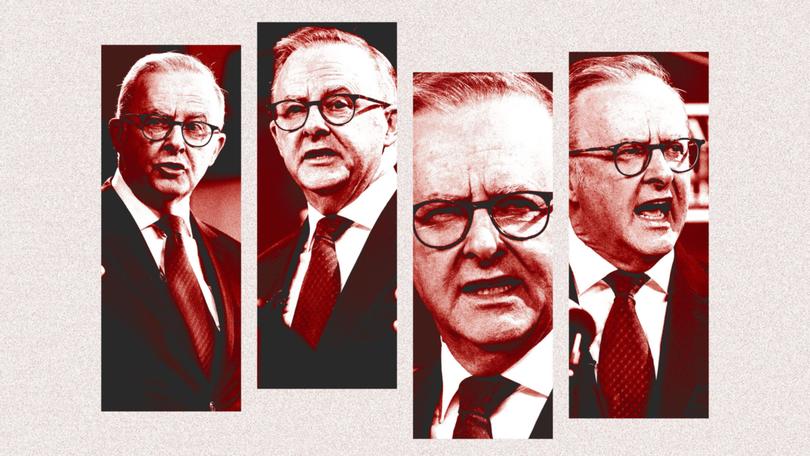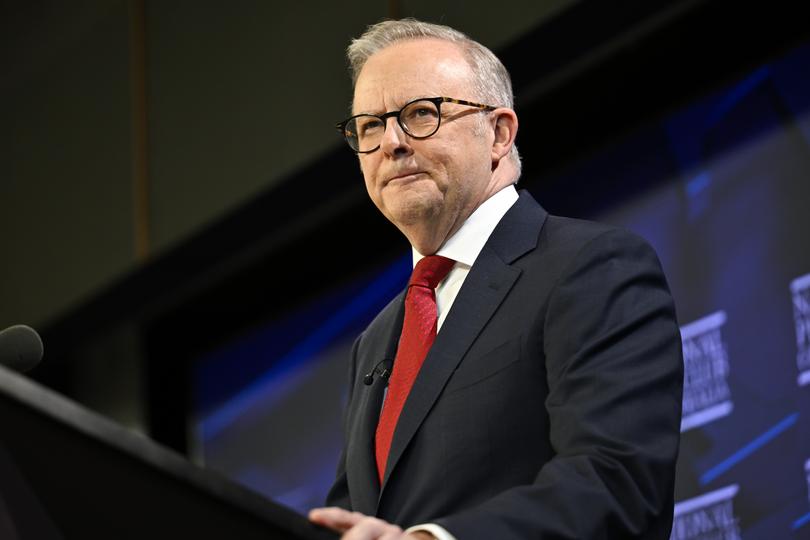Federal election 2025: In final campaign days, Albo sticks to ‘Mediscare’ attacks, sidesteps living standards
With the campaign in its dying stages, Anthony Albanese continues his ‘Mediscare’ attacks on Peter Dutton while attempting to sidestep scrutiny on living standards.

In his closing argument to voters as he awaits judgement day, Anthony Albanese asked voters to compare his record to his opponent’s.
Framing this Saturday’s election as a choice between two “fundamentally different visions” for Australia, the Prime Minister batted away concerns about Labor’s “exaggerated” scare campaigning and danced around whether people really are better off than they were three years ago.
Up in the polls three days before election day, and ahead of a frenetic six-state final sprint, Mr Albanese observed tradition by giving a stump speech at the National Press Club where he listed off Labor’s first-term achievements and neatly packaged up his re-election pitch.
Sign up to The Nightly's newsletters.
Get the first look at the digital newspaper, curated daily stories and breaking headlines delivered to your inbox.
By continuing you agree to our Terms and Privacy Policy.He dedicated precious time needed to convince the millions of voters still undecided to upping the personal attacks on Peter Dutton, framing him as a “wrecker” with a record and no respect for customs.
“A vote for Labor means the certainty of Medicare,” he pledged.
Despite the Opposition Leader matching Labor’s Medicare pledges and seeking to neutralise a health fight at every point, Labor has ruthlessly invoked the Coalition’s own track record as proof the country’s health system won’t be safe in his hands.
The so-called “mediscare” campaign has had potent cut-through with the electorate, so much so that even Liberal insiders have conceded it has hurt them more than anticipated.

It was put to the PM on Wednesday that there had been a high degree of “BS” this campaign, and why he felt he needed to exaggerate. “Why can’t you win this election by telling the truth?” he was asked.
“Just days ago, he was saying that Medicare is not sustainable,” he responded, referring to comments made by Mr Dutton in the last debate.
When pressed on whether that meant his opponent was going to abolish Medicare, Mr Albanese sidestepped the crux of the question and urged voters to look at his opponent’s past performance.
“He (Peter Dutton) tried to abolish bulk-billing. He tried. He tried, and then he tried, also, to introduce a tax — a payment — every time people visited a hospital. He tried to increase the costs of pharmaceuticals by $5,” Mr Albanese said.
“When he couldn’t get his way, he froze the Medicare rebate for six years.
“This is a matter of record. And Peter Dutton said that, if you want to look at future performance, look at past performance.”
As it was pointed out to Mr Albanese by the journalist, he doesn’t have a perfect track record: “Before the election, you said power bills would reduce. They didn’t. You said you wouldn’t change super. You’re trying. You said we’d have cheaper mortgages. We don’t. You said on election night you’d commit to the Uluru Statement in full. You haven’t. You said when you’d messed up, you’d admit fault. You haven’t.”
Mr Albanese, asked by another journalist whether he had any regrets, said he doesn’t “pretend to be perfect”.
The most potent line of attack the Coalition has wielded this campaign has been a question, put to voters by Mr Dutton almost daily this campaign.
Asked if Australians are “better off now than they were three years ago”, Mr Albanese used a classic debating technique.
“The right answer to that is that Australians would be $7200 worse off if Peter Dutton had got his way,” the PM said in response, and again when pushed.
This Saturday’s election is now Labor’s to lose. The size of the victory is the great unknown. For both Mr Albanese and Mr Dutton, the final 72 hours will involve a cross-country blitz of marginal seats in an attempt to shape the final outcome.
If it’s a Labor minority, Mr Albanese again on Wednesday ruled out doing any deals, and ruled out AUKUS as a negotiating tactic.
A Labor majority isn’t out of the question.
But the Coalition is also holding firm in the hope that the outer suburbs of Melbourne and Sydney, who are feeling the cost of living crunch the hardest, won’t pay any mind to the “mediscare” campaign, or indeed the work-from-home scare campaign that also had potency.
The Liberals acknowledge there is no anger at Labor, like there was at the former Morrison Government. But there is a sense of disappointment in those areas that life hasn’t gotten any better for them.
If the Coalition, who will release their costings on Thursday, have tapped into this in among the campaign distractions, there could be some upsets on Saturday night.

